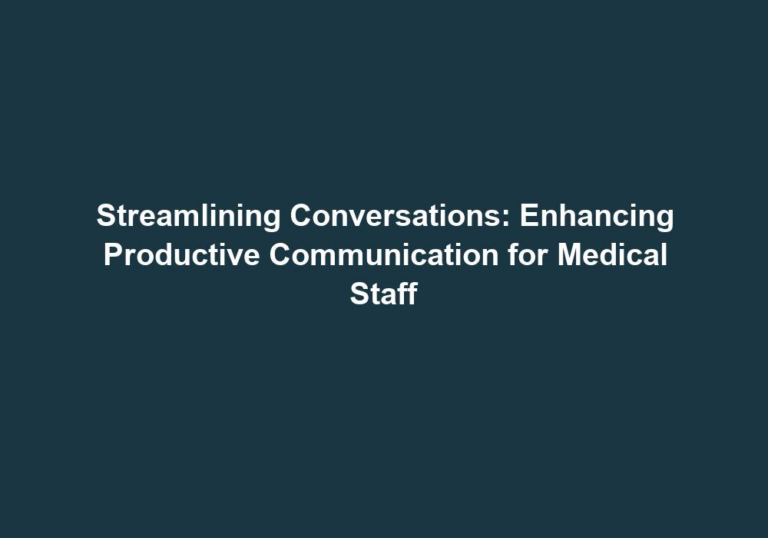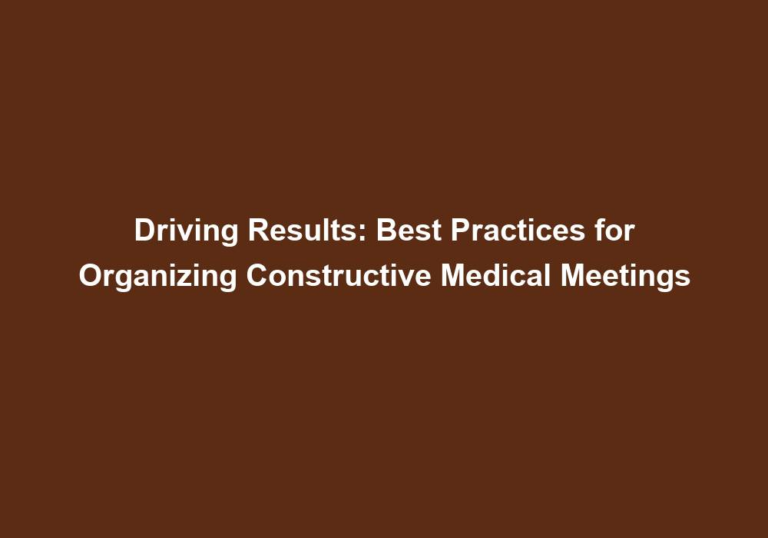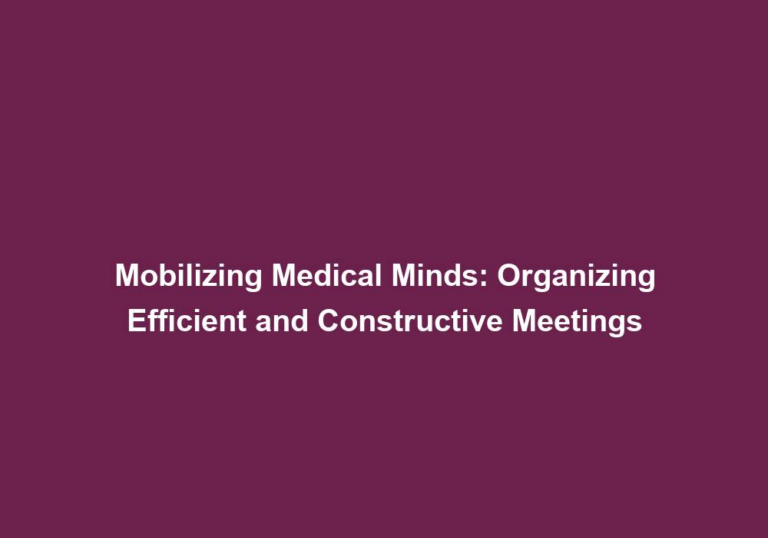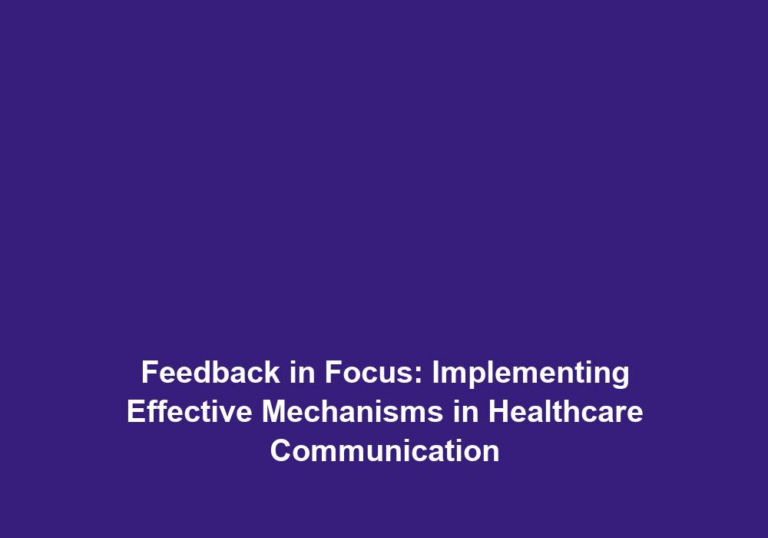Closing the Loop: Establishing Effective Feedback Mechanisms for Medical Teams
In the medical field, effective communication and collaboration among team members are crucial for providing high-quality patient care. Feedback mechanisms play a vital role in ensuring that medical teams continuously improve their performance and deliver the best possible outcomes. This article explores the importance of closing the feedback loop within medical teams and provides practical strategies for establishing effective feedback mechanisms.
Why Feedback Matters in Medical Teams
- Improving Patient Safety: Feedback enables medical teams to identify areas of improvement and address any potential risks or errors in patient care. It helps in reducing medical errors, improving patient safety, and enhancing overall healthcare quality.
Effective feedback is essential for medical teams as it allows them to analyze their performance and identify areas that require improvement. By receiving feedback, medical professionals can take necessary steps to address potential risks or errors in patient care. This helps in reducing medical errors and improving patient safety, ultimately leading to enhanced healthcare quality. For example, if a nurse receives feedback about not following proper hand hygiene protocols, they can rectify their behavior and ensure better infection control practices.
- Promoting Learning and Development: Constructive feedback fosters a culture of continuous learning and professional development within medical teams. It allows team members to reflect on their practices, enhance their skills, and stay updated with the latest advancements in medical science.
Feedback plays a pivotal role in promoting learning and development among medical professionals. By providing constructive feedback, team members can reflect on their practices and identify areas where they can improve. This feedback-driven culture encourages continuous learning and professional development, ensuring that medical teams stay updated with the latest advancements in medical science. For instance, if a doctor receives feedback about their lack of knowledge regarding a new treatment modality, they can take steps to enhance their understanding and provide better care to their patients.
- Enhancing Team Collaboration: Feedback mechanisms facilitate effective communication and collaboration among team members. It promotes trust, mutual respect, and open dialogue, leading to better teamwork and improved patient outcomes.
Feedback mechanisms are vital for enhancing team collaboration within medical teams. By providing feedback, team members can communicate their observations, suggestions, and concerns, fostering an environment of trust and mutual respect. This open dialogue allows for effective collaboration, as team members can freely share their ideas and insights, leading to improved teamwork and ultimately better patient outcomes. For example, if a nurse provides feedback to a physician about the need for clearer instructions in patient handover, it can lead to improved communication and coordination among the team, resulting in enhanced patient care.
- Boosting Employee Engagement and Satisfaction: Regular feedback acknowledges the efforts of individual team members and boosts their morale, job satisfaction, and engagement. It creates a positive work environment that promotes motivation and retention of skilled healthcare professionals.
Regular feedback has a positive impact on employee engagement and satisfaction within medical teams. When individual team members receive feedback that acknowledges their efforts and highlights their areas of improvement, it boosts their morale and job satisfaction. This recognition creates a positive work environment that fosters motivation and encourages the retention of skilled healthcare professionals. For instance, if a nurse receives feedback about their exceptional communication skills and patient-centric approach, it not only boosts their confidence but also reinforces their commitment to providing high-quality care.
Strategies for Establishing Effective Feedback Mechanisms
1. Foster a Culture of Feedback
- Encourage open and honest communication among team members, promoting a culture where feedback is valued and appreciated.
- Emphasize the importance of constructive feedback in professional growth and patient care.
- Provide training and education to enhance feedback skills and ensure that team members feel comfortable giving and receiving feedback.
To establish effective feedback mechanisms, it is crucial to foster a culture where feedback is valued and appreciated. This can be achieved by encouraging open and honest communication among team members, creating an environment where everyone feels comfortable sharing their thoughts and suggestions. Emphasizing the importance of constructive feedback in both professional growth and patient care helps team members understand the value it brings to their practice. Providing training and education on feedback skills further enhances the feedback culture and ensures that team members have the necessary skills to give and receive feedback effectively.
2. Implement Regular Performance Reviews
- Conduct regular performance reviews to assess individual and team performance objectively.
- Set clear performance goals and expectations, and provide feedback based on measurable criteria.
- Schedule feedback sessions in a non-threatening environment, allowing team members to discuss their strengths, areas for improvement, and career aspirations.
Regular performance reviews are essential for establishing effective feedback mechanisms. These reviews provide an opportunity to objectively assess individual and team performance. By setting clear performance goals and expectations, feedback can be provided based on measurable criteria, making it more actionable and constructive. It is important to schedule feedback sessions in a non-threatening environment, where team members can openly discuss their strengths, areas for improvement, and career aspirations. This creates a safe space for feedback exchange and encourages personal and professional growth.
3. Encourage 360-Degree Feedback
- Implement a 360-degree feedback system, where feedback is collected from peers, subordinates, and supervisors.
- This approach provides a comprehensive view of an individual’s performance and facilitates a holistic understanding of strengths and areas for development.
Implementing a 360-degree feedback system is an effective way to gather feedback from various perspectives within the medical team. This system involves collecting feedback from peers, subordinates, and supervisors, providing a comprehensive view of an individual’s performance. It facilitates a holistic understanding of strengths and areas for development, allowing team members to gain valuable insights from multiple angles. For example, a nurse receiving feedback from colleagues, patients, and supervisors can gain a well-rounded understanding of their performance and make informed improvements.
4. Utilize Technology for Feedback
- Leverage technology solutions, such as online platforms and mobile applications, to streamline the feedback process.
- Implement anonymous feedback systems to encourage honest and unbiased feedback.
- Utilize tools that allow for real-time feedback, enabling immediate recognition and course correction.
Technology can greatly enhance the feedback process within medical teams. By leveraging online platforms and mobile applications, feedback can be streamlined and easily accessible to all team members. Implementing anonymous feedback systems encourages honest and unbiased feedback, as individuals feel more comfortable sharing their opinions without fear of reprisal. Additionally, utilizing tools that allow for real-time feedback enables immediate recognition of exceptional performance and facilitates timely course correction when necessary.
5. Create Structured Communication Channels
- Establish structured communication channels, such as regular team meetings, huddles, and debriefings, to facilitate feedback exchange.
- Ensure that all team members have the opportunity to voice their opinions, concerns, and suggestions.
- Encourage active listening and respectful communication during these sessions.
Creating structured communication channels is essential for effective feedback exchange within medical teams. Regular team meetings, huddles, and debriefings provide dedicated platforms for team members to share their feedback. It is important to ensure that all team members have the opportunity to voice their opinions, concerns, and suggestions, promoting inclusivity and collaboration. Encouraging active listening and respectful communication during these sessions fosters an environment where feedback is valued and constructive discussions can take place.
6. Provide Feedback Training for Leaders
- Train team leaders on effective feedback delivery and coaching techniques.
- Equip leaders with the skills to provide constructive feedback that motivates and inspires team members.
- Encourage leaders to lead by example and create a safe space for feedback within the team.
Feedback training for leaders is crucial for establishing effective feedback mechanisms within medical teams. By providing leaders with training on effective feedback delivery and coaching techniques, they can develop the necessary skills to provide constructive feedback that motivates and inspires team members. It is important for leaders to lead by example and create a safe space for feedback within the team, demonstrating the value of feedback and encouraging its regular practice.
7. Recognize and Reward Feedback
- Acknowledge and celebrate instances where feedback has led to positive outcomes or improvements.
- Implement recognition programs that appreciate individuals who actively seek and provide feedback.
- Make feedback a part of performance evaluation and consider it when recognizing team members’ achievements.
Recognizing and rewarding feedback is essential for sustaining a feedback-driven culture within medical teams. When feedback leads to positive outcomes or improvements, it is important to acknowledge and celebrate those instances. Implementing recognition programs that appreciate individuals who actively seek and provide feedback further reinforces the value of feedback within the team. Making feedback a part of performance evaluation and considering it when recognizing team members’ achievements creates a system that encourages feedback exchange and continuous improvement.
Conclusion
Establishing effective feedback mechanisms is crucial for closing the loop within medical teams. By fostering a culture of feedback, implementing regular performance reviews, utilizing technology, and creating structured communication channels, medical teams can continuously improve their performance, enhance patient safety, and promote individual and team development. Embracing feedback as a valuable tool empowers medical professionals to deliver exceptional healthcare and achieve outstanding outcomes.







